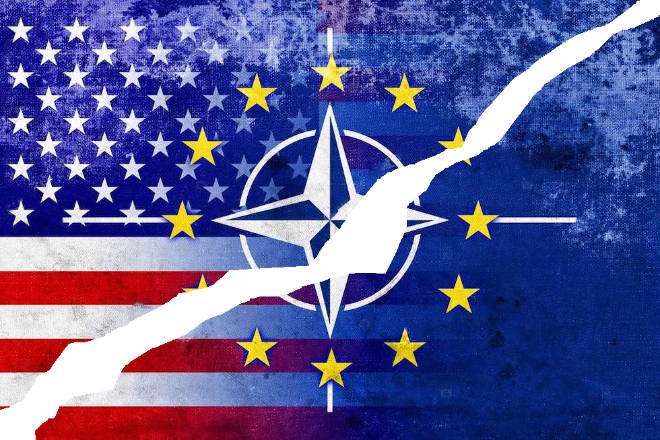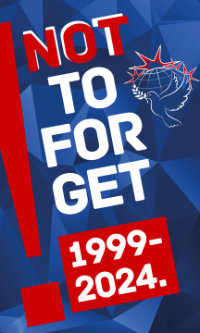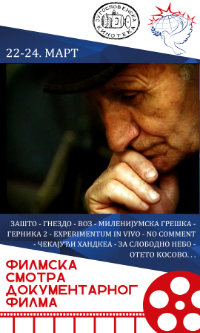NATO/EU split? - Viktor Orban on a peace mission
| Activities - Comments |

Wolfgang Effenberger
In the current crisis, Hungary's head of government Viktor Orban was able to exchange views with Russian leader Vladimir Putin in a nearly five-hour meeting on February 1, 2022. Putin reiterated his calls for security guarantees for Russia and warned of a threat of war in Europe in case Ukraine becomes a member of NATO. In his view, Ukraine wants to take back the Black Sea peninsula of Crimea at all costs and by force if necessary.
Putin's fears are not unfounded. After all, on March 11, 2021, the Ukrainian REGULATION OF THE PRESIDENT OF UKRAINE N2117 / 2021 "On De-occupation and Reintegration of the Temporarily Occupied Territory of the Autonomous Republic of Crimea and the City of Sevastopol" entered into force.(1) The population in Crimea voted in a clear vote on March 16, 2014, for annexation to the Russian Federation. Should these majority pro-Russian Crimean residents be added to the anti-Russia forces in Kiev against their will? That would then mean another civil war. So they don't seem to care much of the people in Ukraine, in Russia or around the world. There are exclusively tangible economic and geopolitical interests on the Western side - as formulated by the British geographer Halford Mackinder in 1904 in his Heartland Theory. The "heartland" is located in the center of Eurasia and in the Russian sphere of influence (from the Volga to the Yangtze River - from the Himalayas to the Arctic).(2) According to Mackinder's materialistic view of mankind, people compete with each other for territory and resources within the framework of their needs for security and prosperity.
In early 1909, Lord Kitchener - the "Hero of Khartoum"(3) - had spoken to the Bavarian Captain in the General Staff, Karl Haushofer, quite unabashedly of the inevitability of a great war, "which would probably have to cost England as well as Germany their mastery of the Pacific ...and would be fought for the Americans and the Japanese."(4)
Indeed, the world was then drifting inexorably toward an inferno.
On May 29, 1914, the American presidential advisor Colonel House wrote to Wilson from the U.S. Embassy in Berlin during his visit to Europe: "[...] This will come to a catastrophe some day, [...] there is too much hatred, too much jealousy. As soon as England agrees, France and Russia will take Germany and Austria in their heels."(5) He was right.
Less than a month later, a few days before the outbreak of war, Cardinal John Murphy Farley, Archbishop of New York, warned at the World Eucharistic Congress at Lourdes (July 22-26, 1914), "The war that is in preparation will be a struggle between international capital and the ruling dynasties. Capital desires to have no one over it, knows no God or Lord, and wishes to have all states governed as a great banking business. Its profit shall become the sole guide of the rulers. [...] Business [...] sole and only."(6)
And on July 31, 1914, just hours before the war began and shortly before he was assassinated, French historian and socialist Jean Jaurès warned, "[...] Here in France we are working with all violent means for a war that must be fought to satisfy disgusting desires and because the Paris and London stock exchanges have speculated in Petersburg [...]; one seeks the war that one has been fomenting for a long time."(7) Should the war break out, it will spread like a plague and lead to the most terrible genocide since the Thirty Years' War."(8)
While Orban was putting out his peace feelers in Moscow, in Kiev British Prime Minister Boris Johnson and Polish Prime Minister Mateusz Morawiecki were demonstratively backing Ukrainian President Volodymyr Selenskyj. And while the U.S. has already put 8,500 troops on NATO's eastern flank on heightened alert and the U.K. has already moved ahead with its arms delivery to Ukraine, Poland now also wants to deliver weapons to Ukraine, including tens of thousands of grenades and artillery ammunition, air defense systems and reconnaissance drones....
To Johnson, Selenskyj made a full-throated promise: "The Ukrainians will defend themselves to the last." He said the Russians must understand that war would end in tragedy. "Therefore, I openly say that will not be a war between Ukraine and Russia. It's going to be a full-scale war in Europe."(9) Unhesitatingly, the German Greens cleared the way for combat drones and new nuclear bombers at their federal delegate conference the last weekend in January.(10) On Wednesday, Feb. 2, 2022, Johnson planned to talk to Putin by phone to keep diplomatic efforts to ease tensions from dying off altogether. But into this intention burst the reports of "Wall Street Journal" and "Washington Post" that 2000 soldiers from the USA will be transferred to Germany and Poland. 1000 US soldiers already stationed in Germany are to be transferred to Romania(11) - détente really looks different. The well-known US journalist and former Deputy Secretary of the Treasury Dr. Paul Craig Roberts (PCR) sees an explanation for the destructive US policy in the muddle between the CV19 policy and the policy towards Russia: The data suggest that "America is very unstable."(12)
Again, this allows a comparison to 1914: between 1903 and 1914, Britain led Europe in strikes, lockouts, and lost workdays. Add to that banking and stock market crises and civil war-like tensions with Ireland. Before World War I, Britain had reached a state of internal discord and disorder comparable to Russia.(13)
Hungary's head of government, Orban, was the first representative of a NATO and EU state to meet Putin in Moscow; he referred to the peacemaking purpose of his trip and expressed the hope that a solution is possible: the positions were far apart, but the problems could be overcome. Let us hope that Orban is not alone in his initiative.
Comments
1)https://lostineu.eu/ukraine-waechst-die-kriegsgefahr/
2)Mackinder, Halford: The geographical pivot of history. The Geographical Journal, Vol. 23, No. 4, 1904, S. 421–437 – dt. Übersetzung: Der geographische Drehpunkt der Geschichte. In: Lettre International, Ausgabe 120, 2018, S. 124–129.
3)Kitchener befehligte die britischen Truppen bei der Niederschlagung des Mahdi-Aufstandes in Sudan und im Burenkrieg
4)Karl Haushofer: Erdkunde, Geopolitik und Wehrwissenschaft, München 1934, S. 8
5)The intimate papers of Colonel House, Cambrigde 1925, S. 249
6) Michael von Taube: Der großen Katastrophe entgegen, Leipzig 1937, S.379
7)Hans F. Helmholdt: Ein Vierteljahrhundert der Weltgeschichte 1894-1919, Paderborn 2011, S. 90
8)https://www.deutschlandfunkkultur.de/vor-100-jahren-warum-haben-sie-jaures-getoetet-100.html
9)https://www.t-online.de/nachrichten/ausland/krisen/id_91589126/ukraine-konflikt-wladimir-putin-warnt-vor-krieg-in-europa.html
10) https://www.friedenskooperative.de/aktuelles/gruene-machen-weg-frei-fuer-kampfdrohnen-und-neue-atombomber
11) https://www.focus.de/politik/ausland/russland-ukraine-konflikt-spd-experte-roth-russland-muesste-hohen-preis-fuer-invasion-in-ukraine-zahlen_id_39783740.html
12)https://usawatchdog.com/america-is-very-unstable-dr-paul-craig-roberts/
13) Christian Wipperfürth: Von der Souveränität zur Angst: Britische Außenpolitik und Sozialökonomie im Zeitalter des Imperialismus, Wiesbaden 2004, S. 270
| < Prev | Next > |
|---|
| Overstatement from Davos 2017. |
Liberal corporative capitalism, for reasons of lowering traveling costs, proposed not to travel to history alone but packed togather with NATO, EU and unipollar World Order. Workers participation has good chances to step in provisionally, buying time for full scale workers selfmanagment. |









